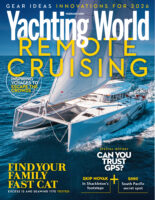Bruno Peyron and team cross Equator after seven days at sea
Bruno Peyron and crew aboard the maxi-catamaran Orange II crossed latitude 0° around 1300 GMT today after 7 days and 3 hours of sailing from the start off Ushant.
This first stretch sees her slightly ahead (190 miles) of the time for the Jules Verne Trophy and 534 miles ahead of the absolute round the world crewed record, held by the American Steve Fossett.
In spite of very different weather conditions from those that were forecast, the giant Orange II covered the 3,500 miles at an average speed of 20.1 knots. On the radio link-up today the skipper of Orange II looked back over the first week.
Bruno Peyron : “We crossed the Equator a quarter of an hour ago. We still have very light winds and are only making 10-12 knots, but we have checked on the satellite photos that we are in the right place. Since the Canaries, we have had very light winds. We can see that from the averages, but the good news is that the boat sails quickly in little wind.
“We shall be coming out of the doldrums around 1° south and we should then start to pick up speed. In the next few hours, the south easterly trades will be appearing and we should be sailing upwind in a steady 20 knots. Afterwards, we shall be heading due south for two days and trying to pick up the system that is around 20-25°S, and then head off to the left.
“During the last week the weather was a bit awkward and not really what we were expecting. Looking back, we clearly made one or two little errors. We could have avoided the calm zone off Cape Verde by heading south after the Canaries.
“As far as the boat is concerned, it’s absolutely fabulous. The boat was well prepared and we haven’t had any problems with her. Concerning the team, they’ve given their all. On board there is the spirit we were expecting and it’s just great.
“We are arriving at the Equator with a boat that is balanced and well run in. We’re not asking ourselves too many questions about what has to be done and when to do it. There are points to check during each watch. When it is a little calmer, we check the 50-metre high mast. We check the halyard rubbing points. It’s all going very smoothly and we’re enjoying it, which is vital for this type of journey.”
“Apart from a few suicidal flying fish, we hit our second UFO yesterday. We didn’t dive, as there was no damage. On my previous boats, we hit whales. In the old Explorer, I never hit anything. I think some boats make more noise than others. I like whales, but prefer to see them in pictures or several miles away.”
- Lead over the Jules Verne record : 189 nautical miles
- Lead over the absolute record: 534 nautical miles



